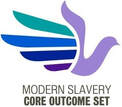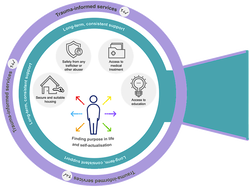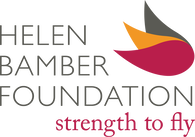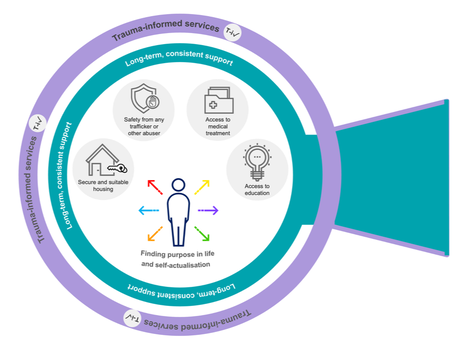The MSCOS Community of Practice is comprised of survivor leaders, academics, multi-disciplinary practitioners, frontline service providers and a range of other stakeholders. The community of practice stakeholders can cultivate a deep level of understanding of the MSCOS at scale, advising on how it may be adapted for use in their specific practice and area of work, and championing it to others.
Its purpose is 3-fold:
Our vision for membership of the MSCOS Community of Practice is wide-ranging, including the original participants of the project, survivor leaders from a wide range of backgrounds and lived experience and professional stakeholders from across the anti-trafficking spectrum. This includes survivor leaders national and international), senior academics within anti-trafficking and other related fields, UK Modern Slavery Victim Care Contract (MSVCC) subcontractors, anti-slavery hubs, independent charities and NGOs (including umbrella organisations), and services that are specifically focused on delivery of the MSCOS core outcomes. It will also include stakeholders from business and corporate organisations (collaborative hubs and initiatives), the legal sector (asylum, immigration, criminal justice, housing), government departments, councils, local authorities and statutory services, children organisations, and international partnerships.
The MSCOS Community of Practice Fellow, Queenie Sit is a central point of contact for the Community of Practice, co-ordinating and engaging with stakeholders and arranging MSCOS activities and events. For more information, please contact Queenie Sit at [email protected].
The Research Advisory Board (RAB) continues its work as a body of survivor leaders to lead, participate, guide and inform the process as it progresses. This will enable survivor-driven policy strategy for change, in relation both to specific Core Outcomes and to the adoption of the MSCOS as a whole.
Its purpose is 3-fold:
- To develop an understanding of the MSCOS Core Outcome Set and to promote its incorporation and embedding into the knowledge base and practice of all relevant service-providers and agencies.
- To utilise the MSCOS Practice Model and other relevant practice models and frameworks which reflect appropriate provision of the MSCOS, in order to engage effectively in web discussion forums, podcasts and online workshops.
- To harness the wide-ranging knowledge and experience of the MSCOS Community of Practice towards a second academic study for the further development of practical, adaptable and measurable standards for MSCOS, This will help to establish robust systems of reporting, monitoring and evaluation for service-providers and agencies.
Our vision for membership of the MSCOS Community of Practice is wide-ranging, including the original participants of the project, survivor leaders from a wide range of backgrounds and lived experience and professional stakeholders from across the anti-trafficking spectrum. This includes survivor leaders national and international), senior academics within anti-trafficking and other related fields, UK Modern Slavery Victim Care Contract (MSVCC) subcontractors, anti-slavery hubs, independent charities and NGOs (including umbrella organisations), and services that are specifically focused on delivery of the MSCOS core outcomes. It will also include stakeholders from business and corporate organisations (collaborative hubs and initiatives), the legal sector (asylum, immigration, criminal justice, housing), government departments, councils, local authorities and statutory services, children organisations, and international partnerships.
The MSCOS Community of Practice Fellow, Queenie Sit is a central point of contact for the Community of Practice, co-ordinating and engaging with stakeholders and arranging MSCOS activities and events. For more information, please contact Queenie Sit at [email protected].
The Research Advisory Board (RAB) continues its work as a body of survivor leaders to lead, participate, guide and inform the process as it progresses. This will enable survivor-driven policy strategy for change, in relation both to specific Core Outcomes and to the adoption of the MSCOS as a whole.
The MSCOS Community of Practice is hosted by the Helen Bamber Foundation.




















